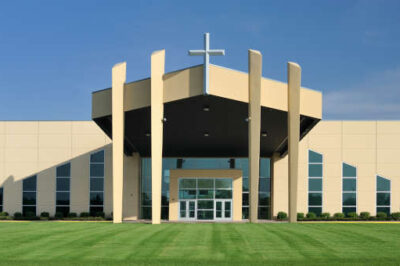The kingdom of God is the rule of God that emanates from His throne. God’s kingdom encompasses all universes, including every sphere of life on earth.
Those stuck in typical church structures only understand the kingdom as it relates to going to heaven. The following points are contrasts based on the implications of understanding that the earth is the Lord’s and the fullness thereof and that His kingdom rules over all, not just the church (Ps. 24; 103:19).
1. The kingdom encompasses all of life. Most contemporary churches depend upon a “church” building as their sacred space. In the kingdom, Christ followers are called to fill everyone else’s building and their concomitant spheres of influence (Eph. 4:10). Unlike the perspective of many contemporary churches, they are not merely called to create and inhabit church buildings for religious use on Sundays.
2. The kingdom releases all saints as ministers. Most contemporary church systems separate clergy and laity. In the New Testament we see that believers are called to function as a royal priesthood and a kingdom of priests (1 Pet. 2:8-9; Rev. 1:6). Hence, all Christians are priests called to be set apart for God’s purposes as ministers. Contemporary church systems recognize only a small percentage of their ecclesial body as clergy (priests). Hence, they disempower the rest of their congregation regarding their sacred calling and relegate them to being spectators and pew sitters.
3. The kingdom releases people to serve in the marketplace. Most contemporary churches only release and equip people to serve in the church space. In the kingdom, it doesn’t matter how many people attend your church service on Sunday; how many are discipled and equipped as ministers to serve their community on Monday is what matters most. Contrawise, in the contemporary church space, people often separate their Sunday church attendance from their Monday vocation.
4. The kingdom applies Scripture to all of life. Many contemporary churches apply Scripture merely to the individual soul. In the kingdom, we turn the world upside down, not just church structures (Acts 17:6). The gospel should positively impact both individuals and communities (Isa. 61:1-4; Matt. 28:19). Jesus told us to pray for His kingdom and will to come on earth. Thus, gospel impact should impact societal systems (Luke 11:2-4). In a typical contemporary church, the focus is solely on the implications of redemption for an individual soul.
5. In the kingdom, all believers participate in Jesus’ ministry DNA. In contemporary churches, only a few are encouraged to participate in His ministry DNA. Paul said that each one of us in the church has received grace according to the measure of the gift of Christ (Eph. 4:7). In this context, the gift of Christ is His ministry DNA, as seen in Ephesians 4:11 (apostle, prophet, evangelist, pastor, teacher). These five basic expressions demonstrate Jesus’ fivefold ministry gifts as illustrated in the four Gospels. In the typical contemporary church, only a few of these five ministry gifts (pastors and teachers) are recognized in the church, and only among the clergy, who tend to be full-time church ministers. Consequently, every person in the church functions in at least one of these five ministry gifts of Jesus, whether in the church place or the marketplace. For example, in the marketplace, the apostles are the entrepreneurs, the prophets are the futurists who predict macro trends, pastors are the caregivers and counselors, teachers are the instructors, and evangelists are those in public relations and sales.
6. In the kingdom, the church shepherds the community. The typical contemporary church shepherds only the flock. Pastors who understand the implications of the kingdom often get their churches involved in caring for the practical needs of their surrounding communities. The lead pastors are also known by many of the gatekeepers of their region as key spiritual leaders to whom they can go for help. In the typical contemporary church, Christians are often only encouraged to serve in their church, and the lead pastor limits his or her gifts, abilities and calling to his or her congregation.
7. In the kingdom, we understand creation grace. In the contemporary church, we only understand saving grace. Lead pastors who understand the kingdom of God realize that God’s temporal blessings come upon the just and the unjust (Matt. 5:45). Through His creation (or common) grace, He calls unsaved civic leaders, His anointed ones, and servants to enact His purposes in society (Isa. 1-4; 45; Rom. 13:1-7). This gives kingdom-minded pastors the theological permission to serve alongside unsaved magistrates and civic leaders for the common good of their cities. In the typical contemporary church, many lead pastors and congregations only collaborate with other like-minded Christians, thus limiting their gospel witness and their capacity to utilize their collective gifts to impact their communities. {eoa}
For more information regarding this theme, purchase Joseph Mattera’s book Understanding the Wineskin of the Kingdom.
Dr. Joseph Mattera is an internationally known author, consultant and theologian whose mission is to influence leaders who influence culture. He is the founding pastor of Resurrection Church and leads several organizations, including The U.S. Coalition of Apostolic Leaders and Christ Covenant Coalition. Dr. Mattera is the author of 13 bestselling books, including his latest, The Purpose, Power, and Process of Prophetic Ministry, and is renowned for applying Scripture to contemporary culture. To order his books or to join the many thousands who subscribe to his newsletter, go to josephmattera.org.
Read articles like this one and other Spirit-led content in our new platform, CHARISMA PLUS.







Leave a Comment
You must be logged in to post a comment.